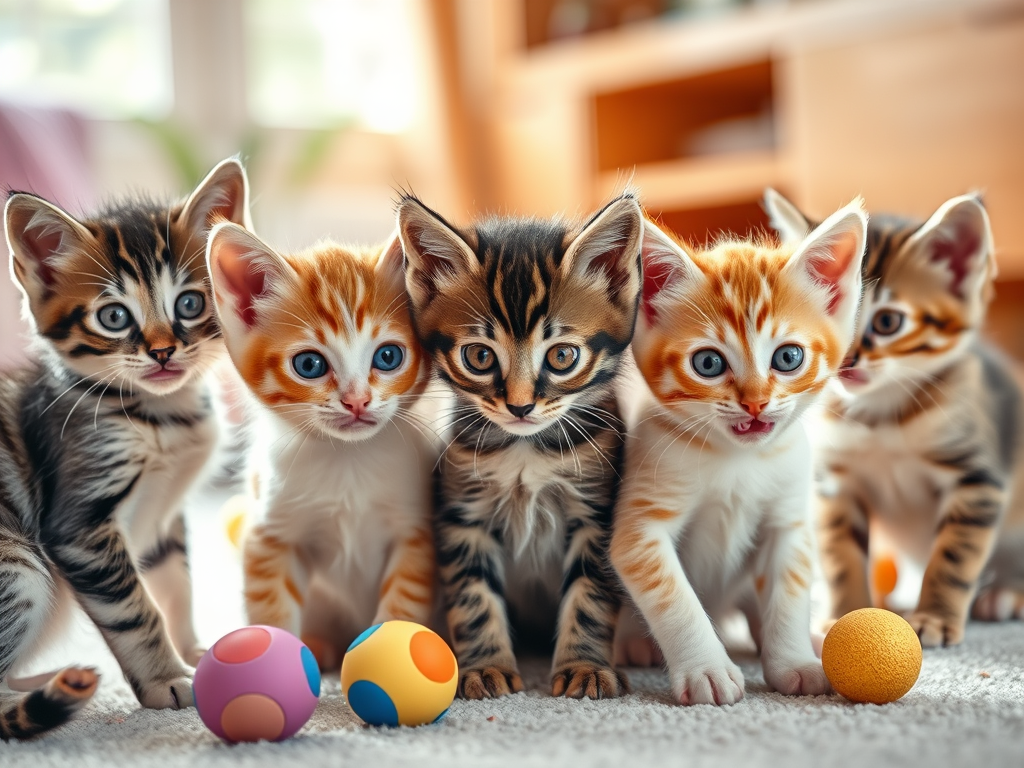Mastering Kitten Socialization: A Key Factor for Their Lifelong Happiness
Socialization is a vital developmental process for kittens, enabling them to become well-adjusted and confident cats. This critical stage shapes their personalities, leading them to grow into confident and friendly adults. A lack of socialization can result in a nervous and anxious cat, making it difficult for them to interact with humans or other pets. Such behavioral issues can hinder the happiness of both the kitten and the owner. By dedicating time to socialize your kitten, you are paving the way for a more joyful and fulfilling companionship.
Engaging in early socialization of your kitten offers a plethora of benefits that significantly uplift their overall quality of life. Picture having a relaxed feline companion who remains calm and composed during visits from friends or when faced with the neighbor’s barking dog. Kittens that are well-socialized tend to manage stress effectively and adapt seamlessly to new experiences, thereby minimizing anxiety and drama in their daily lives.
Studies have shown that kittens who undergo socialization during their formative weeks demonstrate fewer behavioral problems as they grow older. They are more playful, less aggressive, and better equipped to engage in social interactions. This creates a happier environment for both the kittens and their human families, nurturing a loving and serene home dynamic.
Experts in animal behavior and feline psychology consistently stress the significance of socialization for a kitten’s overall mental health. Providing these essential experiences during their early developmental stages lays the groundwork for a successful life, imbuing them with the skills required to flourish in various situations throughout their lives.

Identifying the Perfect Timing and Setting for Kitten Socialization
When it comes to socializing kittens, timing is of the essence. The optimal window for effective socialization typically ranges from two to nine weeks of age. During this crucial period, kittens are particularly open to new experiences, making it the ideal opportunity to introduce them to various stimuli. If you aspire for your kitten to grow into a well-rounded and confident adult, this is the critical timeframe to focus on socialization.
Equally important is the creation of a suitable environment. A calm and safe space allows your little furball to explore without undue fear or stress. Loud noises can easily startle a young kitten and impede their adjustment process, so it’s vital to minimize such distractions. Instead, offer a cozy hideaway where they can retreat and feel secure while gradually encountering new experiences.
Socialization extends beyond just the physical environment; it also encompasses the emotional atmosphere you create. By adopting a gentle and patient demeanor, you encourage your kitten’s natural curiosity and burgeoning confidence. This process includes allowing them to approach new experiences at their own pace, ensuring that they do not feel overwhelmed or frightened.
Establishing a profound sense of safety during their explorations is essential. This approach fosters a foundation of trust that can last a lifetime. Throughout this critical developmental window, kittens should be exposed to a variety of experiences designed to prepare them for life’s ups and downs, helping them learn how to cope with unexpected challenges early on.
Effective Strategies for Successful Kitten Socialization
To facilitate your kitten’s comfort in their surroundings, employing a variety of techniques can turn socialization into a rewarding experience. Start with gradual introductions to different stimuli, using small and manageable doses of new textures, sounds, and people. This method prevents overwhelming your kitten while ensuring they receive essential exposure to the world around them.
Interactive playtime can be a transformative element in a kitten’s socialization journey. Engaging toys that mimic the behavior of prey can greatly enhance their coordination and promote interaction with both humans and other animals, ultimately increasing their comfort levels in social settings.
Another critical component of socialization involves handling your kitten. Frequent, gentle handling by various individuals during their early weeks fosters trust and builds positive associations with humans. Regularly stroke, hold, and engage in playful interactions, ensuring that each experience is enjoyable, rather than intimidating, for your kitten.
Being attentive to your kitten’s body language is vital, as they communicate a great deal through their behaviors. If you observe signs of discomfort, it’s a signal to slow down and reassess your approach. Utilize positive reinforcement techniques, such as treats or praise, when your kitten reacts positively to new experiences. This strategy not only reinforces good behavior but also strengthens the bond of trust between you and your furry companion.

Overcoming Common Obstacles in Kitten Socialization
Socializing a kitten is not without its challenges, and various hurdles may surface during this journey. It’s essential to recognize that each kitten possesses a unique personality, with some being more hesitant to venture outside their comfort zones than others.
Shyness and fear are common barriers many kittens must navigate. You might observe your kitten hiding when unfamiliar visitors enter the room or fleeing at the sound of barking dogs. It’s crucial to approach these scenarios with sensitivity and avoid forcing your kitten into uncomfortable situations. Start by allowing them to observe from a distance before gradually moving closer to new experiences.
Patience and consistency are your greatest allies in this process. Establishing regular routines creates a stable environment that helps kittens feel secure, while patience allows them to adapt at their own pace without feeling pressured.
If your kitten faces significant struggles, it may be beneficial to seek professional guidance. A veterinarian or animal behaviorist can provide valuable insights and tailored strategies to assist your kitten in overcoming specific challenges they may encounter during their socialization journey.
Remember that building trust is a gradual process that requires time and dedication. With a gentle, understanding approach and ongoing support, even the shyest kittens can learn to thrive in social environments, enjoying the company of others.
The Lasting Benefits of Comprehensive Kitten Socialization
Socializing kittens is not just a task to be completed; it represents a fundamental investment in their future well-being. Kittens that undergo proper socialization are more likely to develop into adaptable, curious, and affectionate adult cats. These well-adjusted felines often form stronger bonds with their human companions and other pets, facilitating a deeper integration into family life.
A kitten that is comfortable in diverse situations opens up a world of opportunities for both them and their owners. Traveling, attending veterinary appointments, and introducing new family members or pets become far less daunting when a cat is accustomed to navigating changes with grace and confidence.
Socially adept cats lead more fulfilling lives, experiencing less stress from everyday occurrences. They embrace new adventures without fear, whether it’s making new friends or exploring different areas of the home.
Many pet owners who have committed to socializing their kittens often share heartwarming stories that highlight the rewards of this effort. Witnessing a once-timid kitten engage joyfully with the world around them is incredibly fulfilling and serves as a testament to the profound impact of a thoughtful and patient approach to socialization.
The Article : The Importance Of Socializing A Kitten Appeared First On Unity Pets.
The Article Socializing a Kitten: Why It’s Essential for Development Was Found On https://limitsofstrategy.com


Comments are closed